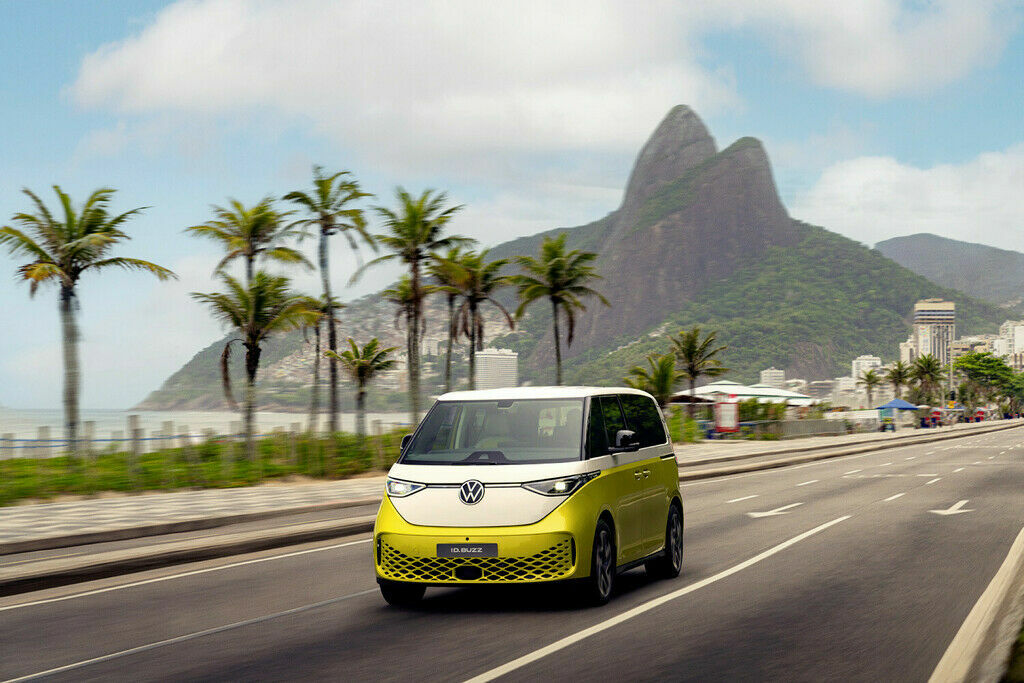Turnaround achieved – further strengthening competitiveness
Thomas Schäfer, CEO Volkswagen Brand: “As a fast-growing car market, South America is of strategic importance to Volkswagen. In recent years, the local team has achieved the turnaround and sustainably improved profitability and competitiveness. The task now is to continue working on the cost position and at the same time implementing the product offensive. To this end, we are investing one billion euros in South America by 2026.” The South America region had returned to profitability in 2021 after many years and already made a significant contribution to earnings in the following year 2022. The region is striving for further improvements as part of the ACCELERATE FORWARD | Road to 6.5 performance program.
Alexander Seitz, Executive Chairman Volkswagen Group South America, explains: “With the product offensive, we are bringing extremely attractive vehicles to customers in Brazil and in South America. It helps us accelerate the transformation to zero-carbon and fully networked mobility. And we are making good progress. The new Polo is already the best-selling car in Brazil. The launch of the best-selling ID.4 and the iconic ID. Buzz in the Brazilian market will bring us further momentum.”
Electric vehicles as subscriptions
The company is investing one billion euros in South America by 2026 – among other things in the development of ethanol-based combustion engines and new business models. For example, more than 3,000 car subscriptions were taken out in Brazil in 2022 at Volkswagen – this number is expected to grow by around 150 percent in 2023. At the same time, Volkswagen will offer its first fully electric vehicles – the ID.4 and the ID. Buzz – in Brazil as subscriptions in 2023, thus driving its transformation to a sustainable mobility provider. The company expects the transformation towards pure
e-drives in Brazil to be less dynamic than in Europe – the overall share of pure BEV vehicles in 2033 in the Brazilian market is estimated at around 4 percent. However Volkswagen aims to grow faster than the market in the BEV segment.
Openness to technology on the Way to Zero
Until the market is fully electrified, Volkswagen will rely on alternative drives and openness to technology. For example, all new models produced in the region will continue to be able to run on 100 percent biofuel. In doing so, they make an important contribution to the sustainability strategy and Volkswagen South America’s Way to Zero. The engines developed in Europe will be adapted and developed in Volkswagen Brazil’s newly opened development center specifically for this purpose. The flex-fuel vehicles developed by Volkswagen in Brazil can basically run on ethanol and petrol, as well as any mixtures of these fuels. In Europe, a maximum of ten percent biofuel is added (E10). One focus of Volkswagen’s product offensive is the A0 and A segment, as well as CUVs / SUVs – the fastest growing market segment in the world. The A0 segment already makes up nearly 40 percent of the South American market and will also continue to grow disproportionately to the market.
Ethanol derived from sugar cane is a sustainable fuel resulting from the fermentation of sugar using yeast. Compared to petrol, this reduces greenhouse gas emissions by up to 80 percent. Sugar cane fields for ethanol production make up less than 0.8 percent of Brazil’s land. Nearly 92 percent of cane sugar is harvested in south-central Brazil, the remaining 8 percent in the North-East – nearly 2,000 kilometers from the Amazon region. The biofuel can therefore make a decisive contribution to the short-term reduction of CO2 in this region of the world.
70 years in Brazil: the success story continues
Volkswagen began production in Brazil 70 years ago in São Paulo – it was also the first plant outside Germany. Twelve employees were assembling parts imported from Germany there at the beginning. Today, Volkswagen is Brazil’s largest automobile manufacturer, having produced a total of 25 million vehicles in 70 years, four million of which were exported. The company develops and produces the Polo, Virtus, Nivus, Taos and T-Cross models, among others, at four plants in the country and sells the cars through around 500 dealerships.






